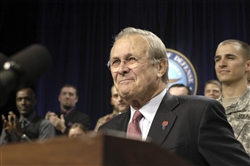A first on FNS today as Senator Ted Kennedy appeared with Chris Wallace discussing Iraq and the far-too-early beginnings of the 2008 Presidential campaign. In the early part of the interview, the Senator preened for us all about how right he was on the question of Iraq in 2003:
WALLACE: But, Senator, let me follow up on that. Last March you said the following, and let's put it up on the screen: "The administration has been dangerously incompetent, and its Iraq policy is not worthy of the sacrifice of our men and women in uniform."
If you truly believe that, don't you and your fellow Democrats have an obligation, now that you are going to be in control of Congress, to try to stop this president from fighting the war?
KENNEDY: Well, first of all, I was opposed to the war. It was the best vote that I ever had in the United States Senate. And in January of 2005, I laid out a pathway toward what I think would have been reconciliation and success in Iraq, two years ago, that called for the reduction of troops, the redeployment of troops, talked about the Iraqis moving ahead in terms of the reconciliation and talked about the regional kinds of diplomacy. That was two years ago.
Now, one thing about the Democrats is we will support our troops, but we also can support our troops so they are not in harm's way. And I think that's a very important...
Pressed to clarify, the Senator responded with this:
KENNEDY: Well, wait and see. That offers all kinds of options. Our commitment is to the troops, so they're not getting caught in a crossfire and a civil war, which they are.
What are their rules of engagement between the Shia and the Sunni today? You can't tell us, and neither can we hear that in the Armed Services Committee. We are involved in that civil war.
And we are not going to pull the line, in terms of the troops. But we are also leaving open options to protect those troops in whatever way that that would come up...
Wallace's line of questioning followed on from his discussions last week about the "Surge option" currently under consideration by the WH. Kennedy is staunchly opposed to adding troops on the ground (having suddenly had a death-bed conversion as to the rightness of US commanders in Iraq). His clarifying statement, it seems to me, represents the Senator's frustration and consternation with the entire situation as he tells Chris that no one knows what the soldiers' role is, not even the Congressional committee charged with oversight of the Armed Forces.
It seems though that the good Senator isn't reading. There are plenty of discussions and contemplations about the current Rules of Engagement in Iraq.
A first hint of what's wrong with the current ROE can be found in this post at Captain's Journal from early this month:
As discussed in Newsweek's expose on Marine Captain Rob Secher, Captain Secher wrote home that "any time an American fires a weapon there has to be an investigation into why there was an escalation of force."
In my article Unleash the Snipers!, I noted that Marines in Ramadi have noted the hindrance the rules of engagement have become to themissionson:
The military has also tightened rules of engagement as the war has progressed, toughening the requirements before a sniper may shoot an Iraqi. Potential targets must be engaged in a hostile act, or show clear hostile intent.
The marines say insurgents know the rules, and now rarely carry weapons in the open. Instead, they pose as civilians and keep their weapons concealed in cars or buildings until just before they need them. Later, when they are done shooting, they put them swiftly out of sight and mingle with civilians.
In my article Racoon Hunting and the Battle for Anbar, I noted that Marines from Fallujah report that:
"A lot of us feel like we have our hands tied behind our back," says Cpl. Peter Mattice, of Bravo Company, 1st Battalion, 24th Marine Regiment. "In Fallujah, [insurgents] know our [rules of engagement] - they know when to stop, just before we engage."
Most recently, from the Milwaukee Journal Sentinel who interviewed PGA golf professionals on a tour of Iraq to entertain the troops, we have this sobering report directly from the front:
"One guy told me, 'I'm hesitant to do the job I was trained for. I don't want to return fire because I might be on CNN the next day.' That's sad. That's a guy risking his life for us. He doesn't want his family to see him on CNN being portrayed the way those guys are being portrayed."
"He said, 'The hardest thing for a soldier to do, despite all his training, is to return fire when he is fired upon,' Kelly said. "It shows the smallness of the position I'm in, comparably speaking. Fear of failure (in golf) and fear of death, come on, there's no comparison."
For those who know about the confused ROE, this should not be surprising.
A week later the same blogger continues the discussion and zeroes in: So there is an argument that the existing ROE is in place due to legalities as discussed above, but there are also true believers in the small footprint and soft glove to "win the hearts and minds of the people." This issue is made more complicated by the involvement and importance of ROE not just at the tactical level, but the strategic and even doctrinal level as well.
In the end, the most compelling witness to the success or failure of a strategy is the effect on the ground. Rules of engagement have a strategic import in that the lack of proper ROE will always cause doctrine to become mute and tactics to fail. The testimony of three respected NCOs is that the current ROE are not only not helpful, but that they are a hindrance and impediment to accomplishment of mission objectives. Thus, the strategic importance of ROE. ROE cannot cause us to win, but they can sure cause us to lose.
...
There will be those who say that the NCOs are not privy to things necessary to understand ROE, or who say that they exaggerated, or any of a host of other things. These things may be said by institutional military, and may even be said from the safety and warmth of an office or living room while typing on a computer. But wishing it doesn't make it so. The NCOs have weighed in, and they have done so without equivocation.
When self-defense is considered to be a subset of unit self defense, and when the commanding officer can restrict the right of individual self defense, the ROE are in need of revision. But the argument at Blackfive is salient. Were it not for media pressure on the war in Iraq, there might be no need for the current ROE. The public has yet to realize that immaculate warfare does not exist.
The problem has many ingredients. One part media pressure, one part ROE in need of revision, one part military brass seeking protection, and one part public expectations for modern warfare combined with waning support for the war, and the result is a witch's brew of problems for U.S. troops.
The take-away is simple and obvious: the current ROE (whatever the specifics) are restrictive and put US soldiers at great risk and even at the extreme, curb their effectiveness. Kennedy is right, we don't know necessarily what the specifics are but we are certainly able to measure the effect. Part of that effect is higher casualty rates over time than we'd seen in years.
The Senator is entitled to his position on the war but I find his support of General's Abizaid and Casey's "light footprint" position somewhastaunchEspecially given his stuanch opposition from the beginning of the President's approach to war-fighting which has always been based on--what else--what the General's on the ground were telling him.
The irony of such was not lost on FNS panel member Bill Kristol who commented on it later in the broadcast. But back to the ROE, we see what they are but what should they be?
Again, I wonder if the Senator is reading. The best argument for what they ought to be that I've seen comes again from Victor Davis Hanson, just two days ago:
If we add another 30,000 or so troops to Iraq, in a final effort to win the war, then we must change (widen) the rules of engagement. Only that way can America ensure that it simply does not create more targets for the insurgents, add a larger logistical trail, and ensure more Iraqi dependency on our soldiers.
What would that entail?
Putting Iran and Syria on notice that we will bomb terrorists flocking across their borders.
Give an ultimatum to militia heads, especially Moqtadar Sadr, to disband or face annihilation from the United States.
Expand the rules of engagement in all matters dealing with IEDs, with a shoot on sight rule concerning anyone found implanting or aiding such efforts.
Enlarge the planned Iraqi security forces to near 400,000, and embed far more Americans in those units.
Recalibrate the ratio of support to combat troops, so that we don't simply create bigger compounds to facilitate larger troop levels to end up with more stationary and more numerous targets--and ever more enclaves of Americans behind thousands of acres of bermed reserves.
So spell out the mission, the new rules of engagement, and then, and only then, surge--if need be--more troops.
Any additional troops need to do what they are trained and best-suited for: military missions, not police work. The first natural target for such is Moqtada Al-Sadr, the thug dressed up in sheik's clothing.
I was of the mind two years ago that we should have more forcefully and directly dealt with him then and my mind remains unchanged. His is the poster child for armed Shiite militia's and the Maliki government, either by choice or circumstance is unwilling and/or unable to deal with him. The US marines will not have the same difficulty finding and defeating his forces and doing so will send strong messages about the seriousness of efforts at finally bringing security to the capitol.










